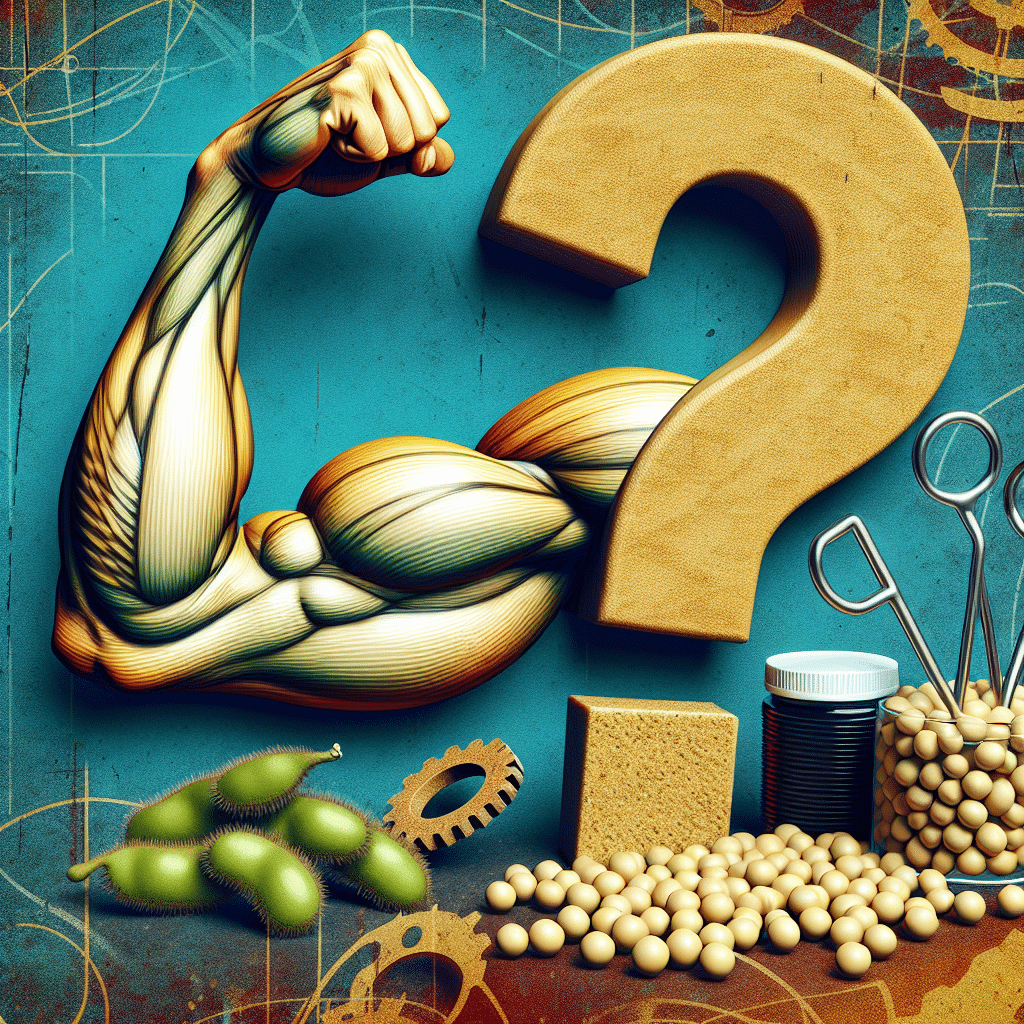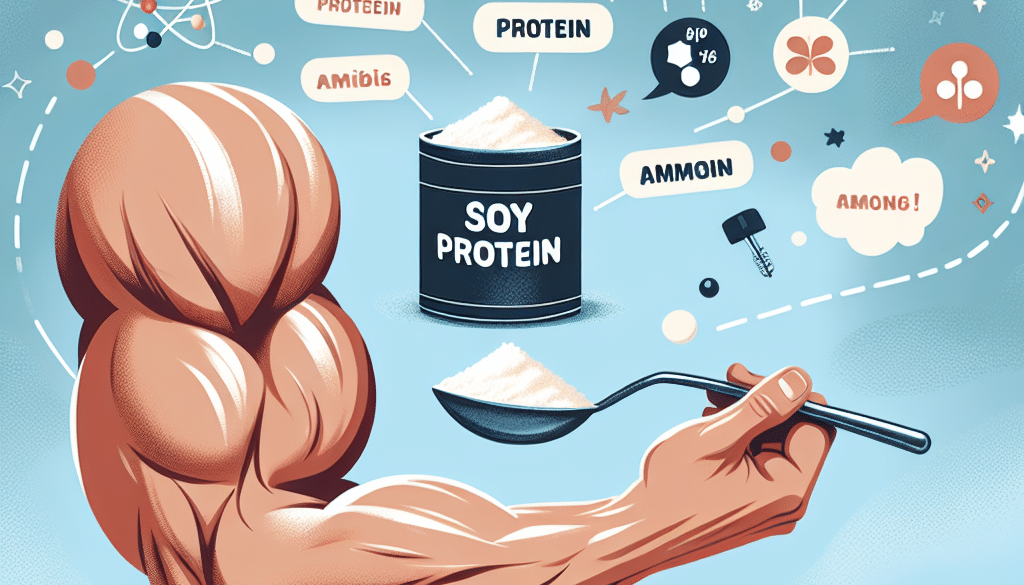Is Soy Protein Good For Building Muscle?
-
Table of Contents
- Soy Protein and Muscle Building: A Comprehensive Analysis
- Understanding Soy Protein
- The Role of Protein in Muscle Building
- Soy Protein’s Efficacy in Muscle Synthesis
- Comparing Soy Protein to Other Protein Sources
- Case Studies and Research Findings
- Benefits of Soy Protein for Athletes
- Optimizing Soy Protein Intake for Muscle Growth
- Potential Limitations and Considerations
- Conclusion: The Verdict on Soy Protein and Muscle Building
- Discover ETprotein’s High-Quality Soy Protein Products
Soy Protein and Muscle Building: A Comprehensive Analysis

When it comes to building muscle, protein is the cornerstone of any athlete’s diet. With the rise of plant-based nutrition, soy protein has become a popular alternative to traditional animal-based proteins. But is soy protein effective for muscle building? This article delves into the science behind soy protein and its role in muscle synthesis, providing a thorough understanding of its benefits and limitations.
Understanding Soy Protein
Soy protein is derived from soybeans, a legume rich in high-quality protein. It contains all nine essential amino acids, making it a complete protein source. Soy protein comes in various forms, including soy protein isolate, soy protein concentrate, and textured soy protein, each with different protein contents and uses.
The Role of Protein in Muscle Building
Protein is essential for muscle repair and growth. During resistance training, muscle fibers experience microtears. The body repairs these tears by fusing muscle fibers together, resulting in muscle growth. Adequate protein intake is crucial for this repair process, and it’s here that soy protein comes into play.
Soy Protein’s Efficacy in Muscle Synthesis
Several studies have investigated soy protein’s effectiveness in promoting muscle growth. The findings suggest that soy protein can indeed support muscle synthesis, although there are nuances to consider:
- Amino Acid Composition: Soy protein contains a good balance of essential amino acids, including branched-chain amino acids (BCAAs), which are vital for muscle protein synthesis.
- Digestibility: Soy protein has a high digestibility score, meaning the body can efficiently utilize the amino acids it provides.
- Hormonal Effects: Soy contains isoflavones, compounds that can exert mild estrogenic effects. However, research indicates that these effects are not significant enough to impede muscle growth in men or women.
Comparing Soy Protein to Other Protein Sources
When compared to whey or casein protein, soy protein holds its own as a muscle-building supplement. While whey protein may be absorbed more quickly, soy protein offers a more moderate release of amino acids, which can be beneficial for sustained protein synthesis over time.
Case Studies and Research Findings
Several studies have highlighted the muscle-building potential of soy protein:
- A study published in the Journal of the American College of Nutrition found that soy protein was just as effective as whey protein in building muscle mass during a resistance training program.
- Research in the Journal of Nutrition showed that soy protein intake post-exercise could enhance overall protein balance and muscle protein synthesis.
These studies, among others, support the notion that soy protein can be a valuable part of a muscle-building diet.
Benefits of Soy Protein for Athletes
Athletes may find several advantages in incorporating soy protein into their diets:
- Plant-Based: For those following a vegetarian or vegan diet, soy protein provides a viable alternative to animal proteins.
- Lactose-Free: Individuals with lactose intolerance can consume soy protein without gastrointestinal discomfort.
- Sustainability: Soy protein has a lower environmental impact compared to animal-based proteins, making it a more sustainable choice.
Optimizing Soy Protein Intake for Muscle Growth
To maximize the muscle-building effects of soy protein, consider the following tips:
- Timing: Consume soy protein within 30 minutes post-workout to take advantage of the anabolic window.
- Quantity: Aim for a protein intake of 1.6 to 2.2 grams per kilogram of body weight per day, depending on training intensity.
- Variety: Combine soy protein with other protein sources to ensure a diverse amino acid profile.
Potential Limitations and Considerations
While soy protein is generally safe and effective for muscle building, there are some considerations to keep in mind:
- Individuals with soy allergies should avoid soy protein.
- Excessive consumption of soy protein may lead to digestive issues for some people.
- It’s important to choose non-GMO and organic soy products to avoid potential pesticide exposure.
Conclusion: The Verdict on Soy Protein and Muscle Building
In conclusion, soy protein is a viable option for building muscle, particularly for those seeking plant-based alternatives. Its complete amino acid profile, digestibility, and positive research findings make it a strong contender in the world of sports nutrition. While it may not be the optimal choice for everyone, soy protein can certainly be part of an effective muscle-building strategy when used appropriately.
Discover ETprotein’s High-Quality Soy Protein Products
If you’re looking to incorporate soy protein into your diet, ETprotein offers a range of high-quality protein products that cater to your needs. Their organic, non-GMO soy protein options are perfect for athletes and health enthusiasts alike. With a commitment to sustainability and purity, ETprotein’s soy protein is an excellent choice for supporting your muscle-building goals.
About ETprotein:
ETprotein, a reputable protein and L-(+)-Ergothioneine (EGT) Chinese factory manufacturer and supplier, is renowned for producing, stocking, exporting, and delivering the highest quality organic bulk vegan proteins and L-(+)-Ergothioneine. They include Organic rice protein, clear rice protein, pea protein, clear pea protein, watermelon seed protein, pumpkin seed protein, sunflower seed protein, mung bean protein, peanut protein, and L-(+)-Ergothioneine EGT Pharmaceutical grade, L-(+)-Ergothioneine EGT food grade, L-(+)-Ergothioneine EGT cosmetic grade, L-(+)-Ergothioneine EGT reference grade and L-(+)-Ergothioneine EGT standard. Their offerings, characterized by a neutral taste, non-GMO, allergen-free attributes, with L-(+)-Ergothioneine purity over 98%, 99%, cater to a diverse range of industries. They serve nutraceutical, pharmaceutical, cosmeceutical, veterinary, as well as food and beverage finished product distributors, traders, and manufacturers across Europe, USA, Canada, Australia, Thailand, Japan, Korea, Brazil, and Chile, among others.
ETprotein specialization includes exporting and delivering tailor-made protein powder and finished nutritional supplements. Their extensive product range covers sectors like Food and Beverage, Sports Nutrition, Weight Management, Dietary Supplements, Health and Wellness Products, and Infant Formula, ensuring comprehensive solutions to meet all your protein needs.
As a trusted company by leading global food and beverage brands and Fortune 500 companies, ETprotein reinforces China’s reputation in the global arena. For more information or to sample their products, please contact them and email sales(at)ETprotein.com today.












